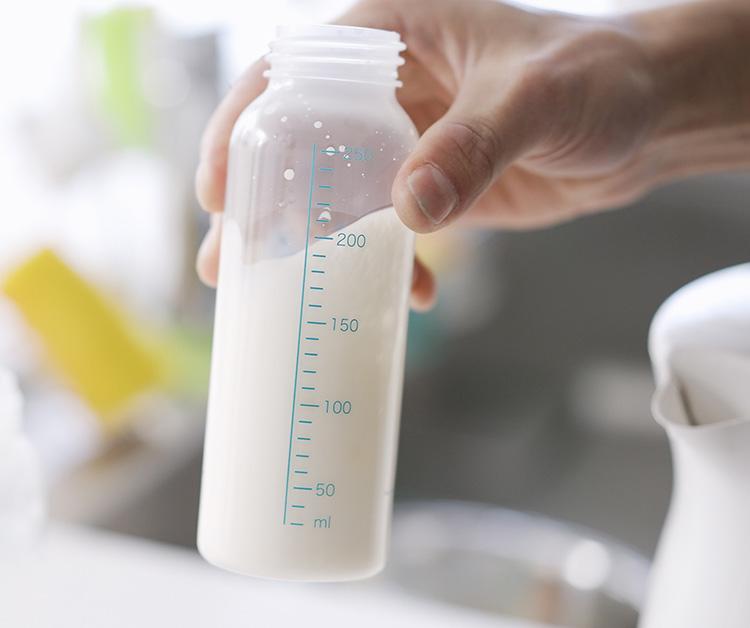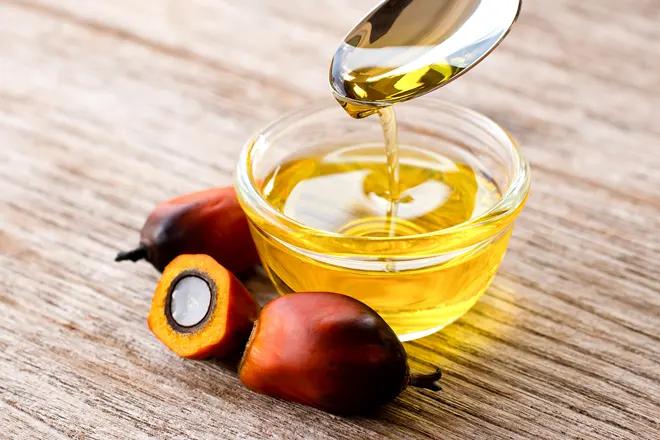
Palm olein oil is an ingredient we use to help make our formula as close to breast milk as possible. Let’s dive into why it’s so good for your baby!
When it comes to making baby formula that’s inspired by breast milk, there’s a lot of things to consider–nutrition is one of the first things that might come to mind, but what about how the body absorbs nutrients? That’s where palm olein oil comes in. Palm olein oil is a key source of nutrients that studies have shown help babies get key nourishment they need, including calcium.
The first and most important reason we use palm olein oil in baby formula is nutrition.
The premium blend of plant-based oils in Enfamil’s formula is closely modeled after breast milk. Like breast milk, palm olein oil is an excellent source of fatty acids such as palmitic, oleic, and linoleic acids. Those fatty acids are sources of energy for the body that can also be considered “building blocks” that the body uses to grow cells.
Everyone’s body needs fuel, but babies have different dietary needs than adults. That’s why breast milk and baby formula are packed with fuel sources like fatty acids. Every baby’s growing little body needs lots of energy in addition to all the vitamins and nutrients that can be found in breast milk and our formula.

Palm oil, palm olein, and palm kernel oils all come from the same edible fruit. Palm olein oil is further clarified to be more pure and shelf-stable.
|
Plant-based oil |
Where it comes from |
What it's used in |
|---|---|---|
| Palm oil | Edible part of the fruit | Used as-is for cooking, salad dressings, etc. |
| Palm olein oil | Edible part of the fruit | Shelf-stable foods, including baby formula, margarine, ice cream |
| Palm kernel oil | Seed of the fruit | Coffee creamer, margarine spreads |
Another key reason we use palm olein oil in baby formula is accessibility. Palm olein oil can be harvested year-round and at greater volumes than alternatives such as sunflower oil.
We source from processing mills in Malaysia and Indonesia and have worked hard to establish traceability all the way back to farms and plantations that grow the fruit. We publish an annual list of these mills on reckitt.com. In 2020, 88% of the palm olein oil used in our products was traceable to mills. The remaining 12% is being verified as one or two suppliers finalize their data.
When it comes to infant formula, it's important that we use a resource that is abundant and accessible. That way we can set ourselves up for success to be able to feed as many babies as we can, every day.
Babies fed infant formula that has palm olein oil absorb and retain as much calcium for bone as healthy infants fed breast milk. When measured at 4 years of age, children fed our products as babies have bone mineral content and bone mineral density similar to those fed breast milk as infants.1
We understand that there have been some concerns raised about the use of palm olein oil in infant formulas. Some have alleged that it negatively impacts calcium absorption, bone mineralization, and stool health among infants who are fed formulas that have it.
However, we want to reassure you that these allegations are based on studies conducted more than 20 years ago (the Nelson 1998 study and Koo 2003 study) that have significant limitations.
Numerous clinical studies have shown that formulas having the multi-oil fat blend in our infant formulas result in growth and development comparable to that seen among infants fed breast milk, are well tolerated and promote soft stools.
We’re proud of the extensive research that has gone into developing an infant formula that is as close as possible to human breast milk. We are confident in the research, our product, and the millions of doctors, parents, and caregivers who chose to feed their children with Enfamil. One of the ways we like to celebrate our community is with Enfamil Family Beginnings®. When you join our program, you’ll get exclusive access to formula discounts and rebates, parenting guidance, and free formula samples! Join or cancel any time–there’s no cost to being a member; countless ways to save and earn!
FAQ
Resources
1Young RJ, Antonson DL, Ferguson PW, Murray ND, Merkel K, Moore TE. Neonatal and infant feeding: effect on bone density at 4 years. J Pediatr Gastroenterol Nutr. 2005. 41; 88-93. Link: https://www.ncbi.nlm.nih.gov/pubmed/15990636
https://www.healthychildren.org/English/tips-tools/ask-the-pediatrician/Pages/is-baby-formula-safe.aspx
All information on Enfamil, including but not limited to information about health, medical conditions, and nutrition, is intended for your general knowledge and is not a substitute for a healthcare professional's medical identification, advice, or management for specific medical conditions. You should seek medical care and consult your doctor or pediatrician for any specific health or nutrition issues. Never disregard professional medical advice or delay seeking medical treatment, care, or help because of information you have read on Enfamil.